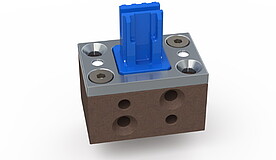
Why ceramic is good
Conventional materials that are electrically insulating only have a very short service life because they wear rapidly. What is more, electronic components and therefore test plugs are become ever smaller in size. Consequently, the fine tolerances called for today mean that manufacturing using plastic can no longer be reliably performed. Only engineering ceramics can serve as electrical insulators capable of permanently meeting these requirements over the entire production period.

Ceramic test plugs
The topic of ceramic test plugs is growing in importance because of the ever-decreasing size of the plugs and the ever-increasing requirements concerning process reliability. High-performance ceramics can be of help in this process: Even a high-performance plastic is never the optimum material choice for a test plug. The plug inevitably comes into contact with the stamped contact pins, which results in wear on the test plug mask. Today's ceramics are ideal for manufacturing even small plugs or other machine components in small numbers. Ceramic is up to 20 times more wear-resistant than hardened steel. The geometrical accuracy of ceramic is guaranteed to remain unchanged, for instance, from the first to the 10 millionth test item/plug insertion.

What components can DOCERAM develop and supply?
From today's perspective, we can conclude that the ceramic materials in our test components will last longer than a product life cycle. This is demonstrated by the fact that we have never had to supply a replacement part for a test plug. As specialists for high-performance ceramics, we manufacture these components in our own facilities using proprietary material mixtures.
Depending on customer requirements, we offer batch sizes starting from 1 unit. Many leading automotive suppliers are successfully using our test plugs in practice.
If requested, we can also design test plugs and other test elements. Provided that the key design features are defined, all we need is a drawing of the component to be tested.

